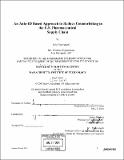An auto-ID based approach to reduce counterfeiting in the U.S. pharmaceutical supply chain
Author(s)
Chakrabarti, Indy, 1975-
DownloadFull printable version (4.144Mb)
Other Contributors
Massachusetts Institute of Technology. Engineering Systems Division.
Advisor
James Masters.
Terms of use
Metadata
Show full item recordAbstract
This thesis will discuss a new approach to preventing the adulteration of prescription medicines in America. The primary thrust of the solution is based on research conducted at MIT's Auto-ID Center on radio frequency technology. The United States faces a growing threat to patient health due to the increasing rate of counterfeit medicine being introduced into the legal pharmaceutical supply chain. This has long been an unresolved global problem, but only recently has it become a major threat in America. Existing legal and technical efforts to control counterfeiting are no longer sufficient to contain the problem. The threat of counterfeits can be partially ameliorated by installing RF-capable electronic tags onto medical packaging, and creating a unique electronic product code (EPC). RF tags though, are not the only component of the required solution. New legal actions, better use of existing technical countermeasures, and industry cooperation are also required. This thesis will outline in more detail the interplay of each of these components in developing a robust solution to the problem of counterfeit medicines.
Description
Thesis (M. Eng. in Logistics)--Massachusetts Institute of Technology, Engineering Systems Division, 2003. Includes bibliographical references (p. 81-82).
Date issued
2003Department
Massachusetts Institute of Technology. Engineering Systems DivisionPublisher
Massachusetts Institute of Technology
Keywords
Engineering Systems Division.